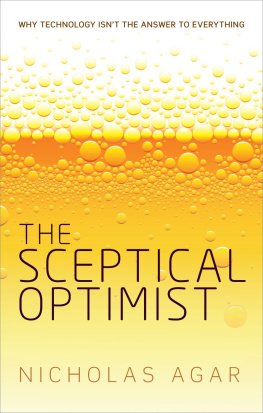The Sceptical Optimist

Great Clarendon Street, Oxford, ox 2 6 dp , United Kingdom
Oxford University Press is a department of the University of Oxford. It furthers the Universitys objective of excellence in research, scholarship, and education by publishing worldwide. Oxford is a registered trade mark of Oxford University Press in the UK and in certain other countries
Nicholas Agar 2015
The moral rights of the author have been asserted
First Edition published in 2015
Impression: 1
All rights reserved. No part of this publication may be reproduced, stored in a retrieval system, or transmitted, in any form or by any means, without the prior permission in writing of Oxford University Press, or as expressly permitted by law, by licence or under terms agreed with the appropriate reprographics rights organization. Enquiries concerning reproduction outside the scope of the above should be sent to the Rights Department, Oxford University Press, at the address above
You must not circulate this work in any other form and you must impose this same condition on any acquirer
Published in the United States of America by Oxford University Press 198 Madison Avenue, New York, NY 10016, United States of America
British Library Cataloguing in Publication Data Data available
Library of Congress Control Number: 2014957565
ISBN 9780198717058
ebook ISBN 9780191026621
Printed in Great Britain by Clays Ltd, St Ives plc
Links to third party websites are provided by Oxford in good faith and for information only. Oxford disclaims any responsibility for the materials contained in any third party website referenced in this work.
For Alexei and Rafael. May they get the best out of futurewell-being technologies.
Acknowledgements
In the writing of this book I benefited from the advice and support of many people. The following friends and colleagues read and commented on parts or all of the manuscript: Jan Agar, Petra Arnold, Sondra Bacharach, Stuart Brock, Caroline Clarinval, Anthony Elder, Simon Keller, Felice Marshall, Csar Palacios, Mark Walker, and Dan Weijers. Latha Menon, ably assisted by Emma Ma and Jenny Nugee, did a great job of shepherding the book through to final publication. Dan Harding, the book's copy-editor, made a great many improvements to the text. I am grateful to anonymous referees for OUP who offered just the right combination of encouragement about the project and scepticism about my claims, and to Nicola Sangster for proofreading. Finally, I owe a special debt of gratitude to my wife Laurianne Reinsborough.
Contents
Now is a time of both great optimism and great pessimism about technological progress. Our technologies are becoming more powerful. The apparent acceleration of this improvement has led to forecasts of colonies on Mars and cures for cancer. But the increase in the power of our technologies seems also to be increasing the magnitude of their messes. The technological errors of past generations might bring crop failures or military defeats. The errors of our current global civilization threaten human extinction. During the Cold War we lived in fear of nuclear apocalypse. The turn of the millennium saw this fear joined in the popular imagination by climate change, a potentially catastrophic legacy of the Industrial Revolution.
This book seeks to take the long view of technological progress. My focuses are not the consequencesgood or badof particular technologies, but rather overall trends in the effects of technological innovation on human societies. The concept of subjective well-being, an increasingly important focus of work in psychology and policy studies, serves as my navigational guide. Put simply, the books central question is: How should we expect technological progress to affect human well-being? We must look past the welter of new social networking technologies, monoclonal antibody medical therapies, and self-driving automobiles to detect long-term trends in the effects of technological progress on well-being.
How do I propose to investigate the long-term effects on well-being of technological change? A long view of technological progress would seem to require comparisons of the well-being of people living at different times possessing different technologies. We lack representative samples of first-century Romans and twenty-third-century New Yorkers to quiz about their attitudes towards their ages technologies. To take the place of these missing survey data I offer a plausible evolutionary conjecture about how our well-being responds to different levels of technology. This conjecture places limits on the long-term improvements of well-being that can come from technological progress.
An awareness of trends in the effects of technological change on well-being reveals that we are subject to a technology biasa tendency to overstate the benefits brought by technological progress. The technology bias makes us reckless in the pursuit of these benefits. I will show how overcoming our technology bias permits a clear-eyed pursuit of more powerful technologies that is alert to relevant dangers.
Some thinkers I call radical optimists seek to encourage and amplify the technology bias. They find inspiration in an apparent acceleration of the pace of technological improvement. The radical optimists predict commensurate improvements of subjective well-being. For example, Matt Ridley expects an imminent rise in living standards to unimagined heights, helping even the poorest people of the world to afford to meet their desires as well as their needs. I argue that radically optimistic expectations of technological progress are mistaken.
Technological progress enhances human well-being in a paradoxical way. This paradox of technological progress concerns the translation of individual benefits from new technologies into benefits for the societies to which the individuals belong. New cancer therapies and smartphones bring significant rewards to individuals. But these benefits do not carry over, in their entirety, to the societies of which these individuals are members. Suppose that increasingly powerful technologies significantly boost the well-being of every individual exposed to them. These do not produce commensurate increases in average well-being.
There is something deeply odd about the idea that technological progress can boost the well-being of every individual in a society without much affecting the average well-being of that society. I argue that this puzzling result is produced by two phenomena.
I call the first of these phenomena hedonic normalization. This is the propensity for human beings to form goals that are appropriate to the environments they experience as they come to maturity. I offer an evolutionary rationale for hedonic normalization. The psychological and emotional mechanisms of subjective well-being are prominent features of human minds. They are likely to have evolved to respond to variation in the environments inhabited by humans. Humans can be hedonically normalized to arctic or to desert environments. So too, we can be hedonically normalized to different levels of technology. There is much about first-century Romans and twenty-third-century New Yorkers that we cannot know. But its reasonable to suppose that they are hedonically normalized to their different environments, and that differences in technology will account for much of the difference between first-century Rome and twenty-third-century New York.













